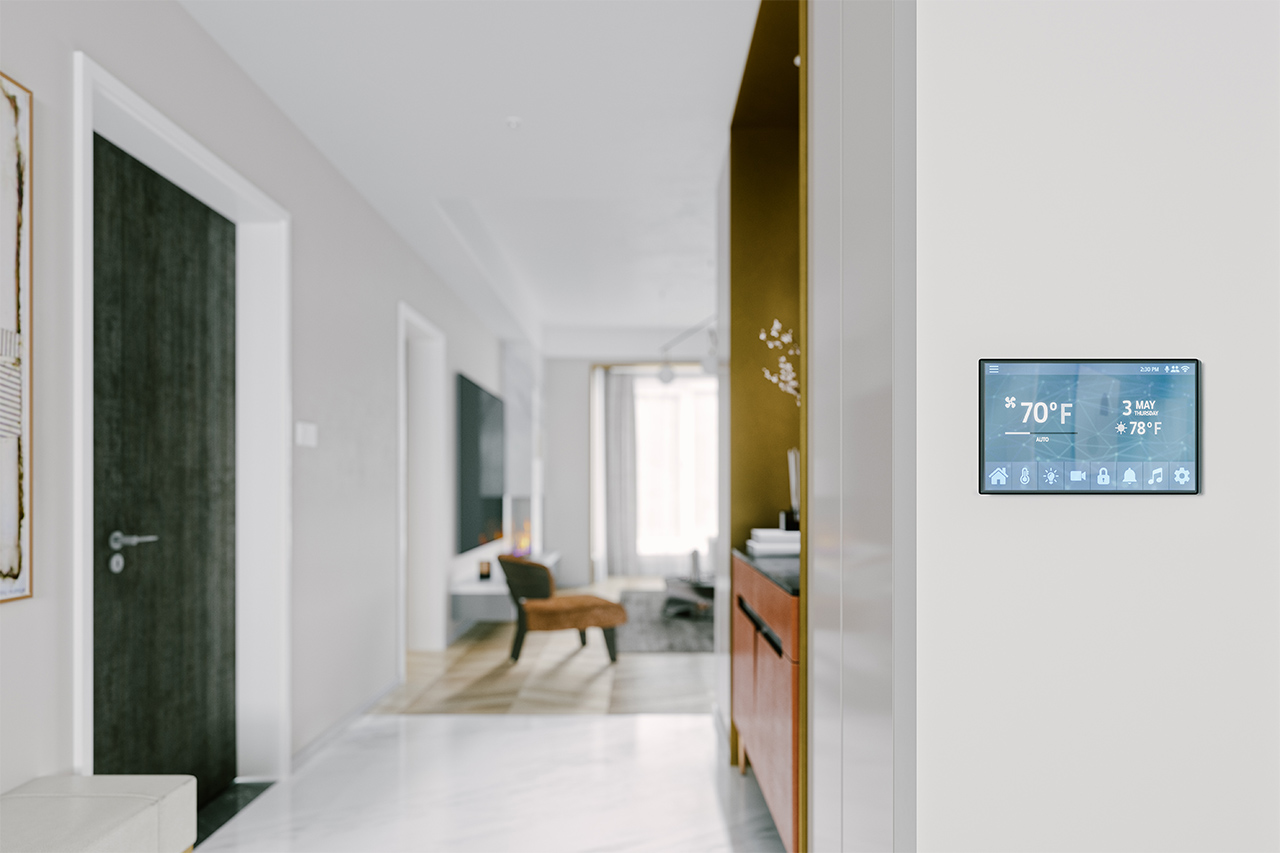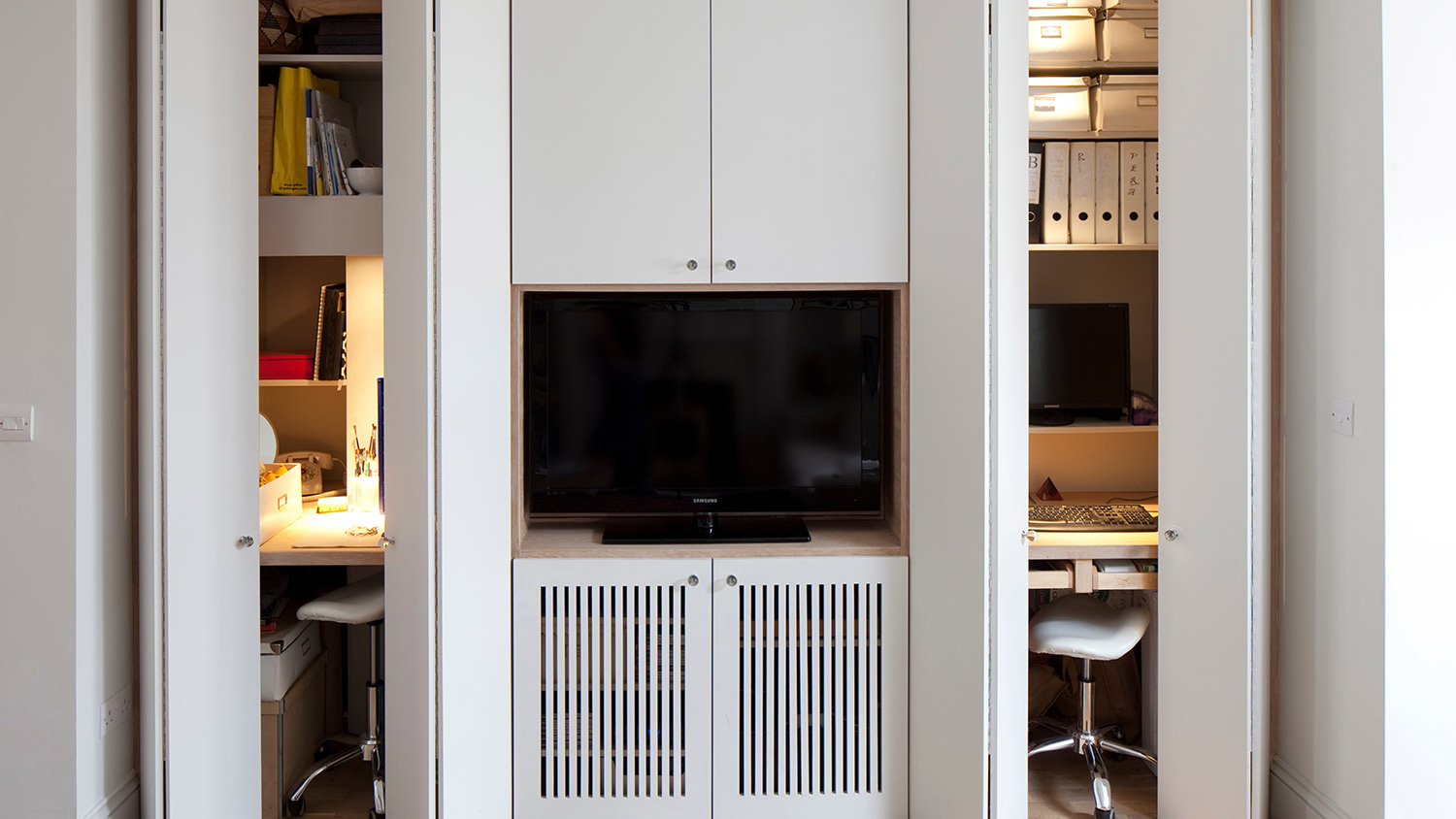
Discover the average smart home system cost, including key price factors and tips to save on installation, devices, and ongoing expenses.
Your smart devices (and their cords) don’t have to be eyesores


The future is here, with smart home devices that can tell us the weather, adjust the temperature, and close the garage door—all from a voice command or tap of a button.
While old-school cartoons and TV shows predicted sleek interiors full of high-tech devices, the reality is that many smart home devices still look a little clunky. While we wait for more stylish design updates to our favorite electronics, try these tips for blending smart home technology into your home decor.
You likely keep a voice-activated assistant in nearly every room in your home. These handy devices allow you to listen to music in the living room, turn off lights in the bedroom, and ask for recipes in the kitchen. But these devices can stand out, and not in a good way. Fortunately, their generally small size makes it easy to hide voice-activated assistants in decorative baskets. Keep your gadget in a stylish woven basket, and place a small plant next to it to conceal the device further.
Yes, you can buy televisions with swappable frames that display art, but if that’s not in your budget, you can disguise your smart TV with handcrafted frames.
This intermediate-level DIY project requires a few tools to create and install, including pine boards, wood glue, finishing nails, a miter saw, a corner clamp, and a finish nailer. You may also need sandpaper, wood stain, or paint, depending on the look you want. If you aren’t confident in your DIY skills, hire a local handyperson to help you complete the project.
Keep in mind that most TVs aren’t meant to showcase one static or non-moving image for long periods of time. So even though you place your smart TV in a decorative frame to disguise it within your decor, it’s best to shut it off when it’s not in use. Leaving a TV on one image for long periods puts it at risk of screen burn-in or permanent marks on your TV screen.
If you want to hide your TV altogether rather than framing it, there are many options to consider. Use a stylish cabinet or media center to hide the smart TV behind doors, ensuring there are holes drilled in the back to prevent overheating. You can also install a hydraulic lift that will raise the smart TV out of the cabinet when you’re ready to watch it and hide it away by lowering it back inside the cabinet.

All those smart gadgets may make your day-to-day life easier, but their cords quickly become a tangled mess and an eyesore. When you flip through a decor magazine or blog, you never see cords scattered on the ground. Cable management is the key to interiors that look seamless.
Walls: Consider hiding cords for TVs and other items in the wall behind the device.
Boxes: Cable management boxes are ideal for holding power strips, so that you can conceal cords for several different smart devices at once.
Sleeves: You can hide cords inside sleeves, which are soft, zippered products that are still flexible, so you can move and bend the cables as needed.
Connectors: These are typically hard pieces of plastic that adhere to the wall and hold cables inside. This method is a great option for renters because it doesn’t involve drilling holes in the wall.
Hiding speakers in a cabinet leads to muffled sounds, so these smart home devices need to be on display. But the black speakers for your record player or bright white surround-sound system tend to stick out in the worst way.
When buying speakers, look for options in colors that blend well with your home design. Some brands offer smart speakers in every hue imaginable, including bright blue and rust-red.
If you don’t want to buy new speakers, consider painting the ones you already have. Note that there is a risk of ruining the sound or the speakers completely, but you may be able to paint polypropylene speakers with paint made for plastic successfully. A safer option is to wrap your speakers with vinyl wrap in the color of your choice.
Maybe you’re not much of a DIY-er or you don’t want to buy a bunch of cable sleeves and decorative baskets. Another way to help blend smart home technology into your decor is to minimize the amount of gadgets lying around. Start by swapping multiple TV speakers for one smart sound bar, replacing a handful of remotes with a universal remote, and minimizing the number of smartphone and watch chargers kept in one room.
Speaking of chargers, these essential items can quickly take over your home. You probably have a couple of chargers stashed on each side of your bed, plus multiple chargers in the living room, home office, and the kitchen junk drawer. Instead of letting these wires run rampant, set up charging stations in your most-used rooms.
There are multiple ways to use this method. You could use a cable management box to store a power strip and multiple chargers, and phones can rest on top while charging. You can also convert a letter tray into a charging station, and use cable sleeves to hide away the cords. Or simply keep chargers and phones hidden away in a media cabinet or nightstand.
Books are a functional and staple decor piece in most homes, and you can turn books you don’t plan to read again into hiding spots for your routers, voice-activated assistants, or other small smart devices. Take out the pages of a hardcover book that’s about as tall as the device you want to conceal, and nestle your device inside for a creative and attractive way to hide your smart home technology.